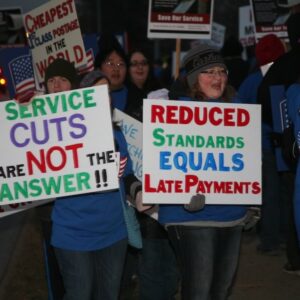March 1, 2015
Motor Vehicle Service Update
(This article first appeared in the March-April 2015 issue of The American Postal Worker magazine.)
The union is pursuing our demand that management create at least 60 new administrative and technical duty assignments in the Motor Vehicle Service Craft, as required by the 2010-2015 Collective Bargaining Agreement (CBA).
Four years after signing the CBA, the USPS still has not created the positions.
Management also has refused to provide the APWU with information the union requested regarding the positions, prompting the union to file an Unfair Labor Practice charge with the National Labor Relations Board (NLRB).
But just before a scheduled Feb. 2 hearing on the union’s charge, the USPS and NLRB signed an informal agreement stipulating that the Postal Service had responded to the union’s request for information. The agreement also stipulates that the USPS will post copies of the settlement on workplace bulletin boards.
The information at issue includes the number and location of any new administrative and technical duty assignments that have been established in the MVS Craft, as well as postal headquarters’ instructions to the field regarding the creation of such positions.
The MVS Jobs Memorandum of Understanding (MOU), which is part of the contract, details the parties’ commitment to create jobs in all components of the Motor Vehicle craft:
- At least 740 automotive technicians and lead automotive technicians;
- At least 600 Postal Vehicle Service (PVS) routes;
- At least 60 administrative jobs.
Section 3 of the MOU requires the parties to conduct an audit of management positions and return administrative and technical duties to the craft. Section 4 says at least 60 additional administrative and technical jobs would be established.
Union Declines to Sign
The APWU refused to sign the agreement because it just didn’t go far enough.
We are requesting a formal settlement agreement, which essentially constitutes an admission of guilt by management. The APWU believes this is justified by the Postal Service’s history of refusing to provide timely information to the union.
The USPS-NLRB settlement also stipulates that the USPS give the union information about how management assigns costs to postal employees when deciding whether or not to contract out work.
The costs assigned to postal employees have historically been based on a national average, but recently the USPS asserted that the costs should be determined locally. The union has filed a Step 4 Dispute protesting the change.
Subcontracting
We expect a decision from Arbitrator Stephen B. Goldberg on the union’s grievance protesting management’s notification to the union that the USPS is considering converting the 162 PVS sites to Highway Contract Routes (HCRs).
The APWU challenged the Postal Service’s authority to even consider this action, because management failed to fulfill agreements from the 2010-2015 Collective Bargaining Agreement and the MVS Jobs MOU.
Four days of hearings were conducted in October 2014; official transcripts were provided to the APWU and USPS, and post-hearing briefs were filed.
DOT Medical Certification
The APWU received clarification from the Postal Service regarding who qualifies as a “medical officer” with authority to sign Department of Transportation health cards for postal employees with Commercial Driver’s Licenses.
The APWU sought clarification of management’s policy in an Oct. 23, 2014, letter, after receiving inquiries from the field. In some places occupational nurses endorsed medical cards, while in other places only doctors were authorized to sign them.
According to a Dec. 11, 2014, letter from postal management, the USPS follows the Federal Motor Carrier Safety Administration’s (FMCSA’s) regulations, which say that medical examiners must be certified and listed in FMCSA’s database. Accordingly, a medical examiner may be “a doctor of medicine (MD), doctor of osteopathy (DO), physician assistant (PA), advanced practice nurse (APN), and doctor of chiropractic (DC).”
Residual Vacancies, Conversions
According to USPS statistics, approximately 320 MVS employees have been converted to career status as a result of residual vacancies since a Memorandum of Understanding on Filling Residual Vacancies was signed in March 2014 and a set of Questions and Answers on the issue was signed by the union and management in May 2014.
The MOU and Questions and Answers have been instrumental in resolving disputes in the field, but our work is not done. We believe there are a substantial number of residual vacancies still to be identified and many conversions of Postal Support Employees still to occur.
Recently, the USPS identified 216 MVS residual vacancies nationwide, including 56 in PVS and 160 in VMF. Residual vacancies can be reviewed on the APWU website, www.apwu.org
Locals must verify management’s records for accuracy. By now, each site should have their own system for tracking these vacancies. Vacancies identified on USPS-provided lists should be filled immediately, either by converting PSEs to career status or by applying language in Article 39.2.11 of the contract, which says, “If there is no PSE in the same occupational group and grade, the residual vacancy shall be filled by other means.”
Locals that have not monitored residual vacancies or PSE conversions should start now. You can request copies of Webcoin reports; review the jobs that are posted in the annual bidding process, and research jobs that senior employees can identify as assignments that were previously occupied by full-time regular employees.
USPS Files Interpretive Dispute
The USPS has filed an interpretive dispute, asserting that the percentage of career duty assignments established in Section 2 of the Motor Vehicle Jobs MOU should be applied nationwide.
The APWU’s opposition to management’s claim is supported by several factors, including that the Postal Service’s position is virtually impossible to apply. The CBA refers to at least 600 routes coming in-house at the end of current HCR contracts.
Tracking whether the appropriate number of career employees has been assigned to a number of duty assignments that are constantly changing is simply too difficult to do on a national scale. The union believes that the percentages can be measured and applied in each district.
As the parties move forward, where HCR work has been returned to the facility, locals should begin tracking the number of duty assignments created pursuant to the MVS Jobs MOU.



